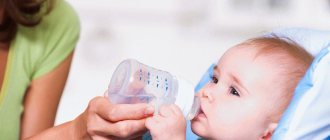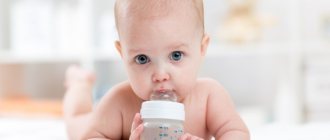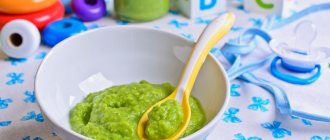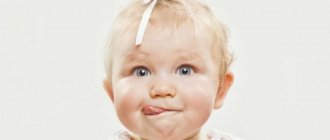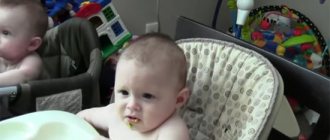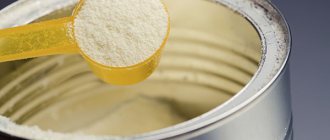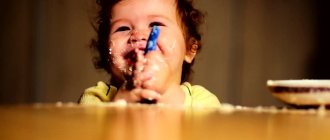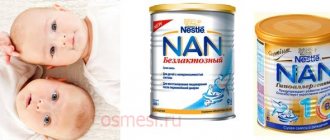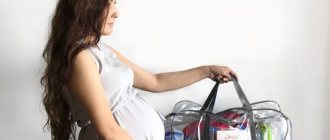Should I give water while breastfeeding?
Breast milk contains 80–90% water. For a newborn, this means both food and drink. The mother's body regulates the composition of milk to suit the baby's needs. Unsaturated foremilk is thinner. It quenches thirst well and restores electrolyte balance.
According to Dr. E.O. Komarovsky, a newborn should be offered supplemental feeding, and he will decide for himself whether to drink or not.
Most pediatricians say that breastfed babies do not need additional fluids until they are 4–5 months old. This is true if there is a sufficient amount of mother's milk.
During artificial feeding and mixed nutrition, water is introduced from the first days. It is vital for a newborn:
- normalizes salt content;
- ensures complete digestion and absorption of proteins;
- prevents constipation;
- helps with bowel movements;
- improves general condition.
In what cases should it be necessary to supplement the infant's diet?
The baby needs more fluid in the following situations:
- summer heat;
- operation of the central heating system in winter;
- intense sweating;
- fever and other cold symptoms;
- intestinal colic;
- diarrhea;
- vomit;
- hiccups
Is it necessary to supplement the baby's food?
Is it possible to give a pacifier to a newborn while breastfeeding?
A popular pediatrician, Evgeny Komarovsky, answering the question of whether it is necessary to supplement a baby with water during artificial feeding, states that if parents manage to maintain optimal air parameters in the room, and the baby does not lose a large amount of fluid, there is definitely no need to supplement children in the first month of life. .
Up to 6 months, it is enough for the baby to receive water along with the formula, which he drinks instead of mother's milk. However, if situations arise in which the baby loses a large amount of moisture, supplementation with clean water is required.
Temperature is the cause of pathological moisture loss
Factors that create pathological fluid loss:
- vomit;
- diarrhea;
- increased body temperature;
- dry indoor air;
- overheating of the air in the room.
During intestinal infections, the child loses a huge amount of water due to diarrhea and vomiting. High body temperature forces the baby to sweat, and sweat also removes moisture from the body.
Important! Most intestinal infections can occur calmly at home if adults are able to give the baby something to drink. As a rule, children die not from terrible diagnoses, but from dehydration that occurs as a result of the disease.
Komarovsky suggests not to be at a loss about how much water a newborn needs to drink, but to offer the child a bottle of clean water an hour after feeding and see whether he will drink it or not. As a rule, children with an undisturbed water-salt balance spit out the bottle, refusing water.
Advice. If a healthy child drinks greedily an hour after eating, parents need to identify and correct their mistakes, namely, put the air in the room in order.
How much water does a formula-fed newborn need?
The volume of a newborn's stomach is small (about 250 ml), so it needs to be supplemented between feedings. The baby will quench his thirst and drink as much as he needs. Rules:
- It is better not to offer drinks before feeding, so that there is room in the stomach for the nutritional mixture.
- When a baby does not drink water, it should not be given by force.
- In hot weather, your baby should be offered a drink every 20–30 minutes.
If the thermometer readings are less than +20° C, there is no need to supplement the child’s drinking. In the case of a “comfort temperature” (+24° C) and a moisture content in the air of 50–70%, the need for additional liquid is 60–100 ml per day.
Experts have differing opinions on this issue. There are other recommendations - from 50 to 200 ml. There is no strict norm. The amount of additional fluid depends on a number of factors:
- individual characteristics of the newborn;
- his state of health;
- climatic conditions;
- season;
- thickness of the mixture.
Artificial and mixed feeding of a child: when and how to give water?
As for infant formulas, when switching to them, the child simply needs to be given clean drinking water.
Children should be given approximately 200 ml of water per day.
Baby food contains a lot of protein, so for better breakdown and absorption, you need to include liquid in your baby’s diet, one of which is water.
With mixed and artificial feeding, pediatricians advise giving children about 200 ml of water per day . This volume will help his digestion process food, and also replenish the body with the necessary microelements.
How to give water to a newborn
It is recommended to give water either 1 hour before meals or 1 hour after feeding.
An hour after feeding, you can give your baby water.
It is recommended to feed the child with a spoon so that parents can better control the dose. In addition, this way you can quickly accustom your child to a spoon and, therefore, normal food.
It is worth noting that water should not be given to the baby by force.
If you bring a spoon to him, and he refuses and moves away from it, then it is better to wait a little more time. As a rule, when a baby feels thirsty, he definitely will not refuse some water.
How to give water to a newborn
There are several ways to feed a newborn. Each of the options is worthy of attention. Convenient for parents and baby:
- Special spoon. It has a special shape that is ideal for the small mouth of a newborn.
- Syringe without a needle. With its help, drops of liquid are carefully injected into the corner of the mouth so that the child does not get scared.
- Bottle with nipple. They are common for newborns who are bottle-fed. Pharmacies offer a wide range of these products. They come in plastic and glass.
- "Sippy cups." These are sippy cups that the baby can hold independently. They are recommended from 5–6 months.
Water is a source of health
It is better to give children purified water.
It is no coincidence that young children are taught to drink water from an early age, because it contains many substances and microelements necessary for life.
The liquid contains calcium, iron, magnesium, sodium, fluoride, sulfates, bicarbonates and other substances. If we are talking about mineral water, then its composition is even richer in useful microelements.
Surely many parents are interested in the question, what kind of water is best to give to children who are still a few months old? First of all, the water must be purified, filtered or boiled. If we are talking about mineral water, then it should be without gas. Always pay attention to the expiration date of products before purchasing!
What kind of water can be given to an infant?
Raw tap water is absolutely not suitable for newborns. Chlorine and pathogenic microorganisms are a threat to the baby’s health. Adviсe:
- The water should be clean, still, warm.
- Artesian, spring (strictly from a proven source) are an excellent option.
- The optimal drinking temperature is 23–25° C. In the first months for “artificial” drinkers, it is better to heat it up to 26–30° C. Cold liquid is less easily absorbed.
If the recommended option is not available, you can use carbonated mineral water. To do this, the liquid must be stirred well and allowed to stand until the air comes out.
You can cool the available clean hot water to room temperature.
Pediatricians recommend herbal infusions as an additional drink:
- For colic - from dill, fennel.
- During a cold, linden infusion is useful.
- Chamomile and mint teas calm the baby.
Boiled water
Pediatricians have different opinions on the use of boiled water. Old school experts recommend boiling regular tap water for 2-5 minutes, letting it cool and giving it to your baby. Modern children's doctors are of the opinion that the benefits of boiled liquid are small. During processing, both beneficial and harmful microorganisms are killed. Salts needed by the body precipitate.
Filtered
Purified filtered water is suitable for feeding infants. This option is affordable. There are children's filter jugs. One cartridge is enough to clean 100-200 liters. He:
- effectively kills pathogens;
- neutralizes chlorine;
- retains mechanical impurities.
Specialized bottled
Pharmacies sell special bottled water for infants. The label indicates the age for which it is intended and the composition. Supplementing with water during artificial feeding promotes the growth and development of the newborn.
Liquid enriched with microelements and vitamins is healthier for babies. Pharmacy options are sold in safe plastic containers.
Can babies have sweet water?
You cannot sweeten any drinks to make your newborn drink more willingly. Sugar provokes thirst, so the baby consumes a lot of liquid, but does not get drunk. The sweet solution is poorly absorbed by the body and overloads the kidneys. If there is a real need for additional fluid, the child will drink an unsweetened drink.
Basic principles
Children on artificial and mixed feeding can be given the following water:
- boiled warm;
- filtered, purified;
- non-carbonated mineral water, specially produced for baby food.
It is worth noting that pediatricians strongly recommend giving your child only purified water.
It is better to give your child filtered water.
It is better to give boiled water rarely . They advise using good filters, since tap water contains hazardous substances for the health of newborns. Due to the consumption of such water, they may develop gastrointestinal diseases.
What liquid can be given to babies?
It is also recommended to give bottle-fed or mixed-fed children tea, juices, and compote. The main thing is to be careful about their composition.
You can give tea to bottle-fed babies.
Remember that your baby may develop an allergic reaction. It’s best to talk to your pediatrician about introducing a certain type of liquid other than water into your child’s diet.
Juices
As a rule, children can be given fruit juice starting from the first months of life.
Newborns can be given juice.
Its amount initially does not exceed 10 ml, and then gradually increases. We are talking about a special juice for children.
Children's teas and decoctions
Children are also recommended to use various children's teas and infusions prepared at home.
Decoctions of lemon balm are good for health.
Decoctions of fennel, lemon balm, dill, anise, and mint are beneficial for their health. Juices and decoctions are given to small children in small quantities - up to 20-30 ml per day . As a rule, teas normalize the functioning of the gastrointestinal tract, have a beneficial effect on the formation of feces, eliminate constipation, and the components present, for example, in mint, can calm the baby.
How much should a baby eat depending on age?
So, how much formula should a newborn eat in the first days after birth? Already 3-4 days after birth, the dose for the baby is approximately doubled, and therefore the daily norm for the baby increases to 250 ml. Every parent giving formula to their baby should remember that every day the amount of formula consumed can be increased by 10 ml. For example, on the third day after birth, a baby can eat 30-40 ml at a time.
The next question that mothers are interested in is how much formula should be given to the baby every 7 days, 14 days, and then by month. Many pediatricians advise giving the baby 50-70 ml of the mixture in the first week of life. There is a special table that tells parents how much formula or mother's milk a child needs in order to feel full and fully develop.
| Child's age | Required amount of mixture for a single dose | Required daily dose of the mixture |
| 1 day | 10 ml | 100 ml |
| 3 days | 30 ml | 250-300 ml |
| 7 days | 55-70 ml | 400-500 ml |
| 14 days | 60-90 ml | 600-800 ml |
| 30 days | 90-110 ml | 700-800 ml |
| 2 months | 140-150 ml | 750 ml |
| 4 months | 200 ml | 850-900 ml |
| 6 months | 220-230 ml | 1000-1100 ml |
| 12 months | 240 ml | 1100-1200 ml |
If parents are worried about whether the diet is correct and whether the baby is gaining weight normally, this can be found out by using a special formula: multiply the baby’s age in days by 10. The resulting mark indicates the amount of food consumed by the child per feeding.
As soon as the baby reaches 10 days of age, the scheme for calculating food intake changes slightly: the amount of formula or breast milk consumed should be equal to 20% of the baby’s total body weight.
Does a newborn baby need drinking water?
It seems that drinking water is simply necessary for every person, especially very young ones. However, in the case of infants, everything is not so clear. So is it necessary to give regular water to a newborn or can you do without it? And if you can give water, then when, from what moment?
A child’s need for drinking water depends on the method of feeding the baby: breast, artificial or mixed.

